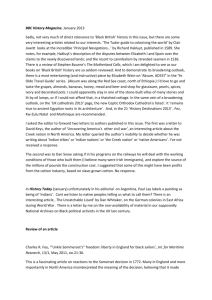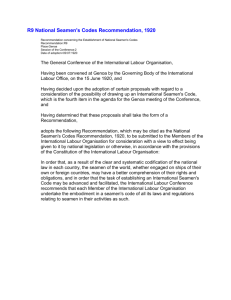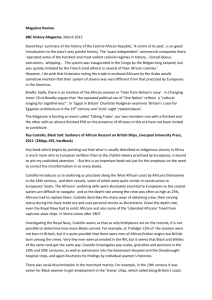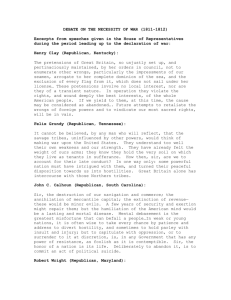Décision des Délégués des Ministres
advertisement
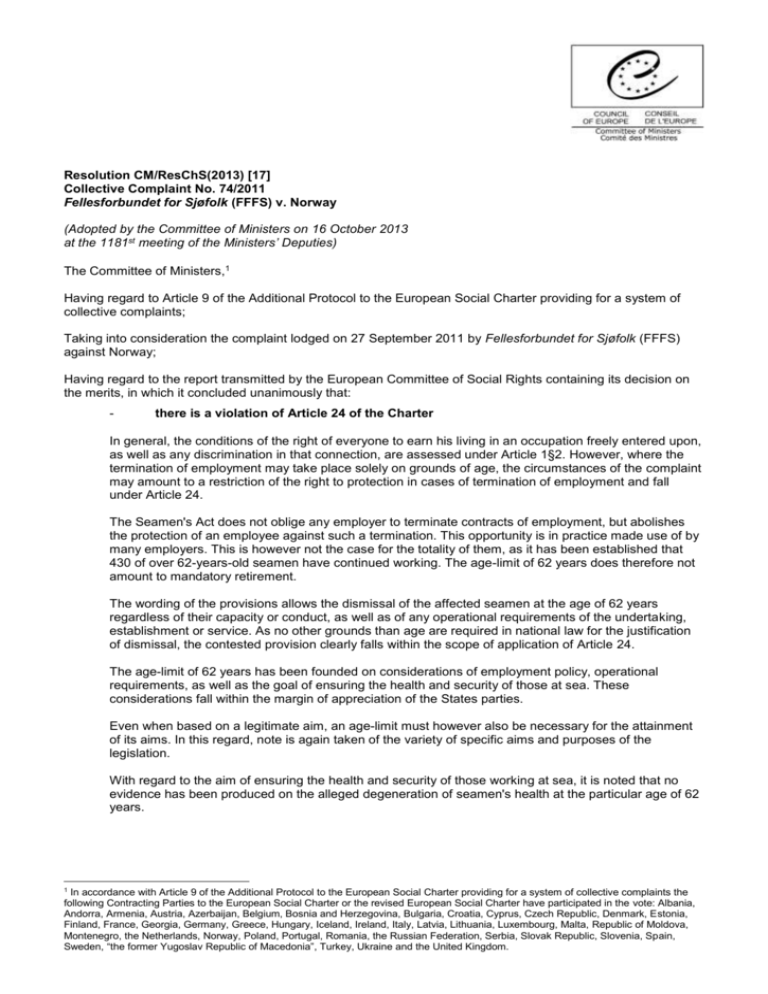
Resolution CM/ResChS(2013) [17] Collective Complaint No. 74/2011 Fellesforbundet for Sjøfolk (FFFS) v. Norway (Adopted by the Committee of Ministers on 16 October 2013 at the 1181st meeting of the Ministers’ Deputies) The Committee of Ministers,1 Having regard to Article 9 of the Additional Protocol to the European Social Charter providing for a system of collective complaints; Taking into consideration the complaint lodged on 27 September 2011 by Fellesforbundet for Sjøfolk (FFFS) against Norway; Having regard to the report transmitted by the European Committee of Social Rights containing its decision on the merits, in which it concluded unanimously that: - there is a violation of Article 24 of the Charter In general, the conditions of the right of everyone to earn his living in an occupation freely entered upon, as well as any discrimination in that connection, are assessed under Article 1§2. However, where the termination of employment may take place solely on grounds of age, the circumstances of the complaint may amount to a restriction of the right to protection in cases of termination of employment and fall under Article 24. The Seamen's Act does not oblige any employer to terminate contracts of employment, but abolishes the protection of an employee against such a termination. This opportunity is in practice made use of by many employers. This is however not the case for the totality of them, as it has been established that 430 of over 62-years-old seamen have continued working. The age-limit of 62 years does therefore not amount to mandatory retirement. The wording of the provisions allows the dismissal of the affected seamen at the age of 62 years regardless of their capacity or conduct, as well as of any operational requirements of the undertaking, establishment or service. As no other grounds than age are required in national law for the justification of dismissal, the contested provision clearly falls within the scope of application of Article 24. The age-limit of 62 years has been founded on considerations of employment policy, operational requirements, as well as the goal of ensuring the health and security of those at sea. These considerations fall within the margin of appreciation of the States parties. Even when based on a legitimate aim, an age-limit must however also be necessary for the attainment of its aims. In this regard, note is again taken of the variety of specific aims and purposes of the legislation. With regard to the aim of ensuring the health and security of those working at sea, it is noted that no evidence has been produced on the alleged degeneration of seamen's health at the particular age of 62 years. 1 In accordance with Article 9 of the Additional Protocol to the European Social Charter providing for a system of collective complaints the following Contracting Parties to the European Social Charter or the revised European Social Charter have participated in the vote: Albania, Andorra, Armenia, Austria, Azerbaijan, Belgium, Bosnia and Herzegovina, Bulgaria, Croatia, Cyprus, Czech Republic, Denmark, Estonia, Finland, France, Georgia, Germany, Greece, Hungary, Iceland, Ireland, Italy, Latvia, Lithuania, Luxembourg, Malta, Republic of Moldova, Montenegro, the Netherlands, Norway, Poland, Portugal, Romania, the Russian Federation, Serbia, Slovak Republic, Slovenia, Spain, Sweden, “the former Yugoslav Republic of Macedonia”, Turkey, Ukraine and the United Kingdom. 2 Where a certificate of medical fitness for the purpose of certain types of tasks aboard a ship may be issued to a seaman having reached the age of 62 years, and where such a seaman may be reemployed by means of a new employment contract for the tasks of a seaman regardless of age, the age-limit of 62 years may not be considered as necessary for the attainment of the desired goals. No sufficiently detailed arguments have been advanced in order to justify the difference in treatment. No specific evidence has been submitted demonstrating how the age-limit of 62 years corresponds to essential professional requirements imposing the earlier retirement of seamen in the present-day conditions. The age-limit is accordingly not based on objective grounds. Moreover, it has not been shown that the desired aims could not have been attained by less intrusive means. The age-limit therefore disproportionately affects the rights of the seamen within its scope of application and no valid reasons within the meaning of Article 24 are required for the termination of employment. As concerns the argument that dismissal pursuant to the obtaining of pension rights is not forbidden in the Annex to the Charter as a reason not justifying dismissal, it is reiterated that not all forbidden grounds of discrimination are listed in the Annex. The contested provision enables dismissal directly on grounds of age and does therefore not effectively guarantee the seamen's right to protection in cases of termination of employment. This is the situation irrespective of whether the seaman in question will be entitled to pension following the termination of his employment relationship. - there is violation of Article 1§2 of the Charter Article 1§2 requires the states having accepted it to effectively protect the right of workers to earn their living in an occupation freely entered upon. The obligation consists, firstly, of the elimination of all forms of discrimination in employment, whatever the legal nature of the professional relationship. The said article also covers issues related to the prohibition of forced labour, as well as certain other aspects of the right to earn one's living in an occupation freely entered upon. The complaint raises issues mainly relating to the first aspect of the article. Under Article 1§2, domestic legislation must prohibit discrimination in employment on grounds of, inter alia, age. It must cover both direct and indirect discrimination. Discriminatory acts and provisions prohibited by the Article may apply to all aspects of recruitment and employment conditions in general, including also dismissal. Exceptions to the ban of discrimination may be authorised for essential occupational requirements or to permit positive action. The contested provision was argued to be discriminatory in relation to any seamen employed on ships registered to a state where the retirement age of seamen is higher than in Norway. The examination of collective complaints does however not entail any comparison between the states parties having ratified the Charter. Moreover, no international standards on the advisable retirement age of seamen were referred to. The examination is accordingly limited upon the situation of Norway. In particular senior pilots and senior oil workers may be considered as comparable categories of workers for the purposes of the current complaint. These categories of employees work in circumstances that may be sufficiently similar in terms of in particular professional hardship and physical strain. The application of the Seamen's Act has the consequence of treating less favourably the seamen within its scope of applicability than anyone who may continue to work in Norway without restrictions to that right after having reached the age of 62 years. It thus establishes a difference in treatment on grounds of age between these categories of employees. 3 The contested legislation does according to its wording not prescribe a lower retirement age. According to information provided by the Government moreover, on 1 January 2013 a total of 430 seamen had been able to continue working at sea despite having reached the contested age-limit. No information on the overall number of seamen no longer employed in the seaman profession at the age of 62 years or thereafter had nevertheless been provided and no comparison could be made between them and those who remain in employment. According to the national Committee moreover, the contested piece of legislation has in combination with the applicable pension law “led many businesses […] to adopt internal systems with the automatic retirement of sailors at the age of 62”. A significant number of seamen are in practice dismissed at 62 years pursuant to the contested provision. This was not contested by the Government. Even though the provision does not according to its wording amount to a mandatory retirement age of seamen, it is often applied as such. Under Article 1§2, elderly persons cannot be excluded from the effective protection of the right to earn one's living in an occupation freely entered upon. This aspect of the right to earn one's living in an occupation freely entered upon is consistent with one of the primary objectives of Article 23, which is to enable elderly persons to remain full members of society and, consequently, to suffer no ostracism on account of their age. The right to take part in society's various fields of activity should be granted to everyone active or retired, including measures to allow or encourage elderly persons to remain in the labour force. Pursuant to the findings under Article 24, according to which the arguments advanced as grounds for the age-limit did not amount to a sufficient justification for the difference in treatment, the established difference in treatment constitutes also discrimination contrary to the right to non-discrimination in employment guaranteed under Article 1§2. Having regard to the information communicated by the Norwegian delegation by a letter dated 12 September 2013 stating that Norway has amended its legislation (cf. Appendix to the present resolution), 1. takes note of the information that Norway has repealed the Seamen’s Act of 1975 and has adopted the Maritime Labour Act which came into force on 20 August 2013 section 5-12 first paragraph of which state that employment can be terminated when an employee turns 70; 2. invites Norway to submit all relevant information on the situation on the occasion of the submission of the next report concerning the relevant provisions of the European Social Charter. 4 Appendix to Resolution CM/ResChS(2013)… Information provided on 12 September 2013 by the Permanent Representative of Norway concerning Complaint No. 74/2011 The European Committee of Social Rights transmitted its report in respect of collective complaint No. 74/2011 lodged by Fellesforbundet for Sjøfolk (FFFS) against Norway to the Committee of Ministers on 17 July 2013. The complaint The complaint lodged by the FFFS was registered on 27 September 2011. The complainant trade union alleged that the Norwegian Seamen’s Act (sjømannslov of 30 May 1975 No. 18), which stipulated retirement for seamen upon reaching the age of 62 years, was to be construed as an unjustified prohibition of employment and a discriminatory denial of seamen’s right to work as such, in breach of Article 1§2 (right to work) and 24 (right to protection in cases of termination of employment) read alone or in conjunction with Article E (non-discrimination) of the European Social Charter.2 The report of the European Committee of Social Rights In its report, the European Committee of Social Rights concluded unanimously that there was a violation of Article 24 and Article 1§2 of the Charter. In its assessment, the Committee held that Article 19§1, subsection 7 3 of the Seamen’s Act constituted a violation of Article 24 of the Charter, as it enabled dismissal directly on grounds of age and did therefore not effectively guarantee the seamen’s right to protection in cases of termination of employment.4 Furthermore, the Committee considered that the age-limit set out in the above-mentioned provision disproportionally affected the seamen who came within its scope of application compared to employees in other occupations and that under Article 1§2 of the Charter, the difference in treatment constituted discrimination contrary to the right to nondiscrimination in employment guaranteed under the said Article. In view of this, the Committee held that the established discrimination amounted to a violation of the effective right of a worker to earn one’s living in an occupation freely entered upon, as provided for under Article 1§2 of the Charter.5 Information about measures taken As mentioned in the Committee’s report, a Norwegian committee appointed by Royal Decree submitted an official report on 1 November 2012 (NOU 2012: 18 Rett om bord – ny skipsarbeiderlov) on revision of the Seamen’s Act. On 21 June 2013, prior to the report of the European Committee of Social Rights, the Storting (Parliament) repealed the Seamen’s Act of 1975 and adopted the Maritime Labour Act [Lov om stillingsvern mv. for arbeidstakere på skip]. The Maritime Labour Act came into force on 20 August 2013. Based on the recommendations of official report NOU 2012: 18, section 5-12 first paragraph of the Maritime Labour Act states that employment can be terminated when an employee turns 70. This corresponds to the general provision on termination of employment due to age in the Working Environment Act [arbeidsmiljøloven], section 15-13a (1). In the Proposition to the Storting (Prop. 115 L (2012-2013)) presenting the rationale for the introduction of the Maritime Labour Act, the government highlights its aim of keeping elderly workers in employment longer. The government emphasises the importance of aligning the rights of seamen with the rights given to workers in general in the Working Environment Act, as far as these rights are congruent with the special conditions in the shipping industry. Conclusion Referring to the adoption and entry into force of the Maritime Labour Act, the Government of Norway considers that its legislation is in full conformity with the European Social Charter. Cf. paragraphs 1 and 2 in the Committee’s decision on the merits. The correct reference is Article 19 (1), sixth paragraph of the Seamen’s Act. 4 Cf. paragraphs 99 and 100 in the Committee’s decision on the merits. 5 Cf. paragraphs 117 and 118 in the Committee’s decision on the merits. 2 3
